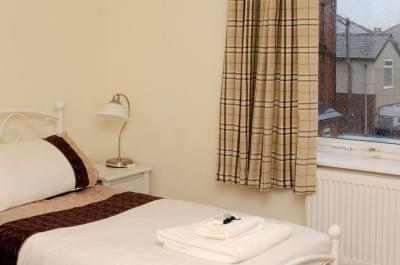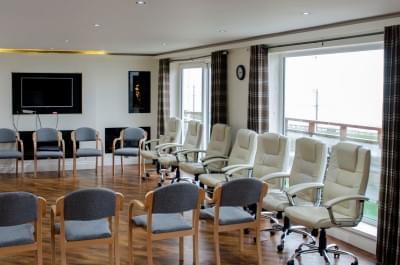Residential Addiction Treatment
At Ocean Recovery, we offer Residential Addiction Treatment here at our centre in Blackpool. Request a Callback
By John Gillen - Last Updated: March 17, 2022
Clinically Reviewed on by Dr Alexander Lapa (Psychiatrist). All information on this page has been reviewed and verified by a certified addiction professional.
If you have realised that you have developed an addiction to a substance or behaviour, and find yourself searching for treatment that is readily available to you, you are likely ready to embark on a drug and alcohol rehab programme.
However, your initial thoughts may be to seek treatment via the NHS. Although the NHS can provide you with the treatment you need to overcome your addiction, why not consider residential addiction treatment?
Quick Links
Quickly skip to parts of this page you are most interested in by clicking on any of the below links.
Residential Addiction Treatment At Ocean Recovery
Residential drug and alcohol addiction treatment at Ocean Recovery is provided to individuals who have regrettably found themselves suffering from a substance addiction or behavioural addiction.
Although many individuals prefer to stay close to home during their time in rehab, attending a private residential rehab is highly beneficial.
In recent years, the demand for private residential addiction treatment has soared. This is because individuals that secure treatment at a residential rehab have much greater chances of making a long-term recovery.
Furthermore, residential addiction treatment provides those struggling with addictions with the opportunity to remove themselves from their everyday life and reflect on the ramifications their addiction has had on them.
In addition, residential addiction treatment also guarantees that those in need receive support and around the clock care, which is essential when considering addiction recovery.
During your stay at Ocean Recovery, you will receive a combination of industry-leading treatments such as detoxification and well-being therapies to ensure that you have the support you require to overcome your addiction. You will also be provided with 12-months of free aftercare support.



Contact Us
94 Queen's Promenade, Blackpool, FY2 9NS, Blackpool, FY2 9NS
Landline: 01253 847 553
Email: info@oceanrecoverycentre.com
Start your Recovery - Call us nowDrug and Alcohol Clinical Detox
As you commence your residential addiction treatment at Ocean Recovery, you will first be required to withdraw from the substance that you have become addicted to.
Our clinical detox typically lasts for seven days. However, depending on the severity of your addiction, detox may last slightly longer. Throughout the detoxification process, you are likely to experience withdrawal symptoms.
While unpleasant, this is entirely normal. It should be noted that clinical treatments and medications can be prescribed if withdrawal symptoms are intolerable.
Although clinical detoxifications are typically administered during residential addiction treatment, in some cases, our team may not deem this as necessary.
As you enter our rehab, our medical staff will determine whether or not you will need to undergo a detoxification programme before completing rehabilitation.
Drug and Alcohol Residential Addiction Treatment Programme
Here at Ocean Recovery, our residential addiction treatment programmes aim to help individuals overcome the physical and psychological ramifications that drug and alcohol addictions have had on their life.
In order to ensure that long-term recovery is achieved, upon detoxing from the substance that you have become addicted to, you will be provided with a wealth of therapies that will assist you in uncovering any factors that have contributed to your addiction.
This may leave you feeling somewhat distressed. However, this is a vital part of your recovery. Without addressing the factors that have caused you to become addicted to substances during your residential addiction treatment, you will be unable to devise coping strategies that will help minimise your risk of relapse in the future.
It should be noted that as you embark on residential addiction treatment, you will be provided with a personalised recovery programme.
At Ocean Recovery, we take great pride in the packages of care that we offer, as they enable clients to obtain the treatment that they need to overcome their addiction.
Unlike outpatient rehab centres, all of our residential addiction treatment is provided on an in-patient basis. This means that you will be required to stay in our rehab as you complete your residential addiction treatment.



Aftercare Support
Once you have completed your residential addiction treatment, our team of medical professionals will determine whether or not you are ready to leave our centre and continue to recover at home.
When the time comes for you to leave our centre, we will ensure that you are provided with appropriate aftercare support. Our aftercare support will equip you with the tools you need to make a long-term recovery. Our aftercare support programmes will also mitigate your risk of relapse within the first year of your recovery.
While your personal aftercare support may vary, we usually provide individuals that have completed residential addiction treatment with us with regular opportunities to meet with others in recovery and activities to keep them motivated.
In addition, your aftercare support will ensure that you have someone to talk to at all times, should you feel at risk of relapse.
Unlike our detoxification and rehabilitation programmes, our aftercare support does not require you to remain in our rehab.
The Facilities Available To Individuals Progressing Through Residential Addiction Treatment
Although the treatment provided to those that obtain residential addiction treatment is of utmost importance, our centre boasts a wealth of facilitates that will make your stay with us more pleasant.
Below, you will find just some of the facilities that will be available for you to take advantage of should you decide to attend our centre.
- Private bedrooms
- Individual therapy rooms
- Group therapy rooms
- Relaxation room
- Communal lounge
- Modern dining area
- External courtyard and outdoor seating
- Large private garden
Contact Us To Secure Residential Addiction Treatment Today
If you are silently suffering from an addiction, or have struggled to secure support, why not contact us today to secure residential addiction treatment at our drug and alcohol rehab centre?
Irrespective of the substance you have become addicted to, we are confident that we can support you in making a long-term recovery.
As and when you are ready to take the first step in overcoming your addiction, our admissions team will be on hand to provide you with the guidance that you need.
By calling us, our team can offer you a wealth of information regarding our residential addiction treatment and can answer any questions that you may have to ensure that you are confident in your decision to attend our rehab.
If you would like to contact us, you can do so by calling 01253 847 553. Alternatively, you can email info@oceanrecoverycentre.com.
Areas We Cover
See below list of just some of the locations our leading alcohol rehab service covers in the United Kingdom.
- Rehab in Liverpool
- Rehab in Manchester
- Rehab in Birmingham
- Rehab in Nottingham
- Rehab in Glasgow
- Rehab in Cardiff
- Rehab in Bristol
- Rehab in Blackpool
- Rehab in Cumbria
- Rehab in Lancashire
- Rehab in Merseyside
- Rehab in Cheshire
- Rehab in Yorkshire
- Rehab in West Midlands
- Rehab in North East
- Rehab in Surrey
- Rehab in Essex
- Rehab in London
John Gillen
- Author
- Last updated: March 17, 2022
John is one UK’s leading professionals in the addiction recovery industry. Pioneering new treatment techniques such as NAD+ and ongoing research into new therapy techniques such as systematic laser therapy, John is committed to providing the very best treatment for people throughout the UK and Europe. During his extremely busy schedule, John likes to regularly update our blog section with the latest news and trends in the industry to keep visitors to our site as well informed as possible on everything related to addiction treatment.

Dr Alexander Lapa (Psychiatrist)
- Clinical Reviewer
- Last reviewed:
MBBS, PG Dip Clin Ed, OA Dip CBT, OA Dip Psychology, SCOPE Certified
Dr Lapa graduated in Medicine in 2000 and since this time has accrued much experience working in the widest range of psychiatric settings with differing illness presentations and backgrounds in inpatient, community and secure settings. This has been aligned to continuation of professional development at postgraduate level in clinical research which has been very closely related to the everyday clinical practice conducted by this practitioner as a NHS and Private Psychiatrist.
He is fully indemnified by the Medical and Dental Defence Union of Scotland (MDDUS) and MIAB Expert Insurance for Psychiatric and Private Medical practice. He is fully registered with the General Medical Council (GMC) in the UK with a licence to practice.
Dr Lapa is approved under Section 12(2) of the Mental Health Act (1983)
Member of Independent Doctors Federation (IDF), British Association for Psychopharmacology (BMA) and The Association for the Study of Obesity (ASO)
Dr Lapa’s extensive experience has also concentrated on the following areas of clinical practice:
– Assessment, Diagnosis and Pharmacological Treatment for Adults with ADHD.
– Drug and Alcohol Dependency and maintaining abstinence and continued recovery
– Intravenous and Intramuscular Vitamin and Mineral Infusion Therapy
– Dietary and Weight Management and thorough care from assessment to treatment to end goals and maintenance
– Aesthetic Practice and Procedures
Request A Callback
Enter your phone number and a member of our team will call you back to discuss your recovery.Contact Us
For more information please get in touch using the information below
Call: 01253 847 553 Send us a messageDownload Our Brochure
For more information about the addiction services that Ocean Recovery offer, download our brochure.
Download our brochureDo I need help?
A lot of people are unsure if there are suffering from addiction. Take these tests to find out if its effecting you without your knowledge.
Select your test and find out more
View Our Other Centres
You might find it easier to get to one of our other recovery centres, we are located all over the UK. Find the best one for you and take a look at their website.

Google Reviews
5
Tel: 01923 369 161
Email: info@cassioburycourt.com
Address: Cassiobury Court, Richmond Drive, Watford, Herts, WD17 3BH
View CentreOur Blogs
-

How To Quit Cocaine
Once an expensive party drug for the elite, cocaine use is now more common with a wide spectrum of cocaine users across society – due to the drug being cheaper and purer than ever. Casual use can quickly turn into a full cocaine addiction with both women and men being affected. The rate of cocaine-related
-

What Are Cocaine Eyes?
It is often said that the eyes are the window to the soul. But they can also be the window to spotting a serious problem: Cocaine addiction. Derived from the Coca plant, cocaine is seen by many as a recreational drug that isn’t addictive. This is a misconception. Cocaine is highly addictive. It is a
-

What does alcohol addiction look like?
Alcoholism is distinctly stereotyped. Someone who suffers from an alcohol dependency is automatically envisioned to drink at all hours and to be heavily influenced by alcohol. They are regularly described as a low life, and as someone who lacks willpower and who cannot control themselves. Stereotypes are however incorrect, making it even harder to spot
-

6 Ways To Keep Up With Drug Addiction Treatment
To overcome a substance use disorder, addiction treatment is an essential step. Both illicit and prescription drugs cause physical and psychological changes if abused and enabled. Those changes impact behaviours, actions, wellbeing, and mental health, requiring intervention. Addiction treatment is a strong recommendation, helping to intervene. Yet the exact addiction treatment services that each person
-

What is the disease model of addiction?
An addiction is diagnosed as a chronic brain condition which is re-occurring and compulsive. It is categorised under the disease model, as it is a condition which requires treatment and management to motivate and sustain recovery. Whilst recovery can be achieved from the likes of a drug or alcohol addiction, relapse is an expected part
-

Club Drugs: The Risks, Effects and Dangers
Many people across the United Kingdom partake in “club drugs,” whether that be to try and enhance the atmosphere on a night out or to increase the intensity of a party at a friend’s house. However, while many people, particularly young people, partake in consuming party drugs at the weekend, this is often done without
-

How Does Binge Drinking Affect Your Health?
According to the charity Alcohol Change UK, more than a quarter (27%) of people who drink in the UK say that they binge drink on their heaviest days of drinking. Binge drinking refers to downing relatively large amounts of alcohol in a short space of time. But what is the precise definition of binge drinking and
-

4 Signs of A Substance Use Disorder
A substance use disorder, also diagnosed as a substance-driven addiction is a brain disorder. Through the misuse and abuse of addictive substances, such as alcohol or drugs, the inability to control consumption can soon become a reality. Addictive substances, such as the legal use of alcohol, medical use of prescription drugs, or illicit use of Class A drugs are highly influential. Whilst initial use is a conscious decision, whether
-

The Impact Of Alcohol Addiction
Alcohol is perceived as a harmless, innocent substance. It’s legal to purchase and consume and is heavily normalised across many cultures. With such a safe image, consuming alcohol is seen as a low-risk action. Yet in fact, long-term consumption can amount to many physical and psychological impacts. Moderate consumption levels can have short-term effects on the body and brain. Hangover-like symptoms are the most associated impact, brushed under
-

New Year In Rehab – What To Expect?
Sometimes Christmas isn’t always the most wonderful time of year. Those suffering from alcohol and drug addiction find it a particularly difficult time. It’s a period where excessive drinking and frequent nights out are on the cards where drugs could be taken and letting your hair down is encouraged. This festive atmosphere is not a bad thing. But if